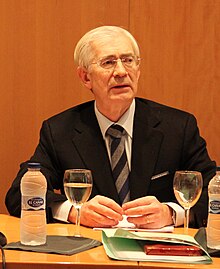Óscar Alzaga: Difference between revisions
→External links: no such page on Commons (at least not at this moment) |
+ wls; removed EL and 1 parent cat |
||
| Line 1: | Line 1: | ||
{{Short description|Spanish jurist, academic and politician (born 1942)}} |
{{Short description|Spanish jurist, academic and politician (born 1942)}} |
||
{{Use dmy dates|date= |
{{Use dmy dates|date=October 2023}} |
||
{{Infobox officeholder |
{{Infobox officeholder |
||
| image = Oscaralzaga29nov2012ur.jpg |
| image = Oscaralzaga29nov2012ur.jpg |
||
| Line 27: | Line 27: | ||
From 1969 Alzaga started his academic career at Autonomous University of Madrid.<ref name=uned/> In the [[Francoist Spain]] he was part of the Tácito group which was a tolerated opposition movement.<ref name=ervr99>{{cite book|title=Encyclopedia of Contemporary Spanish Culture |
From 1969 Alzaga started his academic career at Autonomous University of Madrid.<ref name=uned/> In the [[Francoist Spain]] he was part of the Tácito group which was a tolerated opposition movement.<ref name=ervr99>{{cite book|title=Encyclopedia of Contemporary Spanish Culture |
||
|year=1999|publisher=Routledge|location=London|page=54|editor1=Eamonn Rodgers|editor2=Valerie Rodgers|archive-date=27 December 2020 |
|year=1999|publisher=[[Routledge]]|location=London|page=54|editor1=Eamonn Rodgers|editor2=Valerie Rodgers|archive-date=27 December 2020 |
||
|url=http://1.droppdf.com/files/C7uZ6/encyclopedia-of-contemporary-spanish-culture.pdf|isbn=0-415-13187-1|archive-url=https://web.archive.org/web/20201227124034/http://1.droppdf.com/files/C7uZ6/encyclopedia-of-contemporary-spanish-culture.pdf}}</ref> Alzaga joined the [[Union of the Democratic Centre (Spain)|Union of the Democratic Centre]], an election alliance, in 1977 general elections being part of the [[Christian Democratic Party (Spain)|Christian Democratic Party]].<ref name=ervr99/> He was among those who criticised the Union of the Democratic Centre in terms of its approach towards the [[center-right politics]].<ref>{{cite journal|author1=Jonathan Hopkin|author2=Caterina Paolucci|title=The business firm model of party organisation: Cases from Spain and Italy|journal=European Journal of Political Research |
|url=http://1.droppdf.com/files/C7uZ6/encyclopedia-of-contemporary-spanish-culture.pdf|isbn=0-415-13187-1|archive-url=https://web.archive.org/web/20201227124034/http://1.droppdf.com/files/C7uZ6/encyclopedia-of-contemporary-spanish-culture.pdf}}</ref> Alzaga joined the [[Union of the Democratic Centre (Spain)|Union of the Democratic Centre]], an election alliance, in 1977 general elections being part of the [[Christian Democratic Party (Spain)|Christian Democratic Party]].<ref name=ervr99/> He was among those who criticised the Union of the Democratic Centre in terms of its approach towards the [[center-right politics]].<ref>{{cite journal|author1=Jonathan Hopkin|author2=Caterina Paolucci|title=The business firm model of party organisation: Cases from Spain and Italy|journal=[[European Journal of Political Research]] |
||
|volume=35|doi=10.1023/A:1006903925012}}</ref> In July 1982 he left the Christian Democratic Party to establish the People's Democratic Party.<ref name=johng/> He headed the party until May 1987 when he resigned from the post.<ref name=johng>{{cite journal|author=John Gilmour |
|year=1999|volume=35|doi=10.1023/A:1006903925012}}</ref> In July 1982 he left the Christian Democratic Party to establish the People's Democratic Party.<ref name=johng/> He headed the party until May 1987 when he resigned from the post.<ref name=johng>{{cite journal|author=John Gilmour |
||
|title=Losing Its Soul: The Changing Role of Christian Democracy in the Development of Spain's New Right|journal=South European Society and Politics|volume=10|issue=3|page=416,423,430|doi=10.1080/13608740500282223}}</ref> [[Javier Rupérez]] replaced him as the chairman of the People's Democratic Party.<ref name=johng/> |
|year=2005|title=Losing Its Soul: The Changing Role of Christian Democracy in the Development of Spain's New Right|journal=[[South European Society and Politics]]|volume=10|issue=3|page=416,423,430|doi=10.1080/13608740500282223}}</ref> [[Javier Rupérez]] replaced him as the chairman of the People's Democratic Party.<ref name=johng/> |
||
==Works== |
==Works== |
||
| Line 45: | Line 45: | ||
{{Reflist}} |
{{Reflist}} |
||
==External links== |
|||
{{Authority control}} |
{{Authority control}} |
||
{{DEFAULTSORT:Alzaga, Oscar}} |
{{DEFAULTSORT:Alzaga, Oscar}} |
||
[[Category:20th-century Spanish lawyers]] |
[[Category:20th-century Spanish lawyers]] |
||
[[Category:20th-century Spanish politicians]] |
|||
[[Category:1942 births]] |
[[Category:1942 births]] |
||
[[Category:Autonomous University of Madrid alumni]] |
[[Category:Autonomous University of Madrid alumni]] |
||
Latest revision as of 18:16, 22 October 2023
Óscar Alzaga | |
|---|---|
 | |
| Chairman of People's Democratic Party | |
| In office July 1982 – May 1987 | |
| Preceded by | Office established |
| Succeeded by | Javier Rupérez |
| Personal details | |
| Born | Óscar Alzaga Villaamil 29 May 1942 Madrid, Kingdom of Spain |
| Alma mater |
|
Óscar Alzaga (born 29 May 1942) is a Spanish jurist, academic and politician. He is the founder of People's Democratic Party. Until 1987 he was an active politician in Spain.
Biography[edit]
Alzaga was born in Madrid on 29 May 1942.[1] He received a degree in law from the University of Madrid in 1964 and a PhD degree from Autonomous University of Madrid in 1972.[1]
From 1969 Alzaga started his academic career at Autonomous University of Madrid.[1] In the Francoist Spain he was part of the Tácito group which was a tolerated opposition movement.[2] Alzaga joined the Union of the Democratic Centre, an election alliance, in 1977 general elections being part of the Christian Democratic Party.[2] He was among those who criticised the Union of the Democratic Centre in terms of its approach towards the center-right politics.[3] In July 1982 he left the Christian Democratic Party to establish the People's Democratic Party.[4] He headed the party until May 1987 when he resigned from the post.[4] Javier Rupérez replaced him as the chairman of the People's Democratic Party.[4]
Works[edit]
Alzaga has written extensively in Spanish about the transition from Francoism to Democracy:[5]
- (2021). La conquista de la transición (1960-1978)
- (2020). Derecho político español según la Constitución de 1978
- (2019). 40 años de constitución: una mirada al futuro
- (2018). Sociedad democrática y Constitución
- (1973). La primera democracia cristiana en España[4]
References[edit]
- ^ a b c "Curriculum Vitae. Óscar Alzaga Villaamil" (PDF). UNED. Archived from the original (PDF) on 21 July 2021. Retrieved 21 July 2021.
- ^ a b Eamonn Rodgers; Valerie Rodgers, eds. (1999). Encyclopedia of Contemporary Spanish Culture (PDF). London: Routledge. p. 54. ISBN 0-415-13187-1. Archived from the original (PDF) on 27 December 2020.
- ^ Jonathan Hopkin; Caterina Paolucci (1999). "The business firm model of party organisation: Cases from Spain and Italy". European Journal of Political Research. 35. doi:10.1023/A:1006903925012.
- ^ a b c d John Gilmour (2005). "Losing Its Soul: The Changing Role of Christian Democracy in the Development of Spain's New Right". South European Society and Politics. 10 (3): 416,423,430. doi:10.1080/13608740500282223.
- ^ "40 títulos para "Alzaga Villaamil Oscar"" (in Spanish). Todos tus Libros. Retrieved 12 February 2022.
